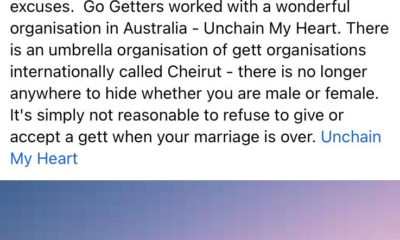
Featured Item

Breaking the chain of gett refusals
She wants her freedom; he wants his power, so he withholds a gett (a Jewish divorce) making her an agunah (chained woman). Dedicated to addressing this crisis around the world, Rebbetzin Kayla Goldstein is in South Africa to share her expertise.
The Israeli-born, United States-based rebbetzin says she has always questioned things that don’t make sense. “I grew up in a religious community and went to school in an intense environment,” she says. “I wasn’t allowed to ask questions in school, and when I did, I was often kicked out.” Although she could ask questions at home – her father, a rabbi, was always open and willing to learn – it just wasn’t something that was done culturally.
That’s why Goldstein ultimately founded the organisation, Questioning the Answers, which aims to create a safe space for people to ask and answer questions on Judaism.
On her organisation’s Instagram page, many began questioning how Hashem could allow an agunah. A woman becomes an agunah when her husband refuses to give her a gett, effectively keeping her chained to him as she’s considered married and is unable to move on with her life.
“You can’t force a man to write it, he has to do so of his own free will,” Goldstein says. “So, men that are abusive can get drunk with power and use the gett as a means of exerting control.” Conversely, a woman can refuse to accept a gett from her husband, leaving him stuck in the sense that he has to continue to provide for her.
“This issue lit something in me because the way we were doing it was so different from the way that the Torah told us to do it,” Goldstein says. “I started talking to rabbis and others about what we should do. It ballooned, and thank G-d, we’ve been able to help people.”
Goldstein has, nonetheless, had to be tenacious in the fight against an often-taboo subject. “I spent a whole year being hung up on and told I was never going to change the system. I’m most proud of changing the conversation and bringing rabbis to the table.”
Though Goldstein had never been exposed to the issue of gett refusals, once she became involved, she learned that her late grandmother had been an agunah. At a massive asifa (gathering) she organised, her father shared his story. “His mother was an agunah, and he was tasked at the age of 14 with getting my grandfather to give her a gett. It was a stressful time, and he emphasised that it was abusive to the children as well.”
Once Goldstein began working in this area, many came forward with stories of their friends, relatives, or even themselves. “More people than we realise are going through this,” she says. “Even if they’re not an agunah, they’re going through a divorce where they’re very much headed towards it, and they feel a big loss of control and don’t know how to help themselves. We can help them before it gets to a case of an agunah, at which point it becomes a lot harder.”
As Goldstein delved into the world of agunot, she was approached by esteemed Australian rabbi and halachic advisor Rabbi Yehoram Ulman. Together, they co-founded the Va’ad, dedicated to championing the rights and dignity of those suffering from igun around the world. Igun refers to cases either in which a husband refuses to grant a gett to his wife or the wife refuses to accept a gett from her husband. Goldstein runs the Va’ad under Ulman’s halachic guidance.
“The Va’ad is an ever-growing committee of leading rabbis from around the world as well as lawyers, mental-health experts, and betei din [rabbinical courts of Judaism],” she says. “The goal is to have this everywhere in the world. There should be nowhere for somebody to run and hide if they’re holding another person hostage.”
Goldstein manages each case, assigning an applicable professional and following up. She regularly consults with Ulman and leading rabbis around the world, especially in regard to particularly problematic cases.
“The goal of the Va’ad is that we should get to a place of complete intolerance of igun,” she says. “When you get divorced, you give a gett. It shouldn’t become something people use as leverage.”
Once the Beth Din has done everything it can for you, and the husband still won’t comply, you become an agunah who relies on the community “to pressure him, his family not to support him, and so on”, says Goldstein. “The community shouldn’t become judge and jury; it needs to listen to the Beth Din’s decision.”
This sometimes includes an order to excommunicate the man in question. Yet this isn’t always heeded, with some communities protecting men with whom they share an allegiance. “That doesn’t mean we should allow abuse. The community needs to create a no-tolerance zone,” Goldstein says.
In South Africa, civil marriage is recognised by the state, and religious marriage is recognised by the Beth Din. “When you divorce, you need both a civil and a religious divorce,” says Michelle Blumenau, the co-founder of Go Getters – the South African Gett Network.
She advises couples to get a gett before a civil divorce. “If you don’t have a gett by the time you get to a civil court, you must highlight this for the judge and insist that there is a clause in your divorce agreement that mentions that the gett needs to be given within a certain time,” she says. The Divorce [Amendment] Act of 1996, in fact, allows South African courts to prevent a Jewish husband from obtaining a secular divorce without giving a gett.
Though South African cases of prolonged gett refusal are rare, Go Getters has helped to free more than 20 people since its inception in 2016. “We have three cases that we’re actively working on,” Blumenau says. “One case is too many as a great deal of suffering is involved.”










